Current Affairs January 2017 - Environment
News 1 - New Ginger species discovered in Andamans

Scientists of the Botanical Survey of India (BSI) have discovered a new species of Ginger from the Andaman and Nicobar Islands. The species Zingiber pseudosquarrosum, belongs to genus Zingiber.
The ginger is already in use among the tribals of the Andamans for its medicinal values. The fresh extract (juice) of fleshy tuberous roots of this species is used to treat abdominal pain and anti-helminthic troubles. It is edible and can be propagated vegetatively from the rhizome.
News 2 - Scientists reveal a new fault in the Indian Ocean which may trigger earthquakes in future
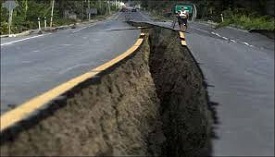
Scientists, based on the study of seismic data recorded before, during and after the 2012 quakes and sea floor depth analysis, have revealed that a new plate boundary may be forming on the floor of the Indian Ocean in Wharton Basin. The study showed that the plate had broken along a 1,000-km fracture zone that can trigger more quakes in the future.
A Slip-strike earthquake occurs when two plates slide horizontally against one another.
News 3 - SC described the effects of Endosulfan use to be devastating

The Supreme Court has described side effects of Endosulfan to be devastating and directed the Kerala government to release the entire Rs. 500 crore compensation to over 5,000 victims. Endosulfan is a highly toxic agrochemical (pesticide).
The major numbers of victims were reported to be affected in Kasargode (Kerala). The Stockholm Convention on Persistent Organic Pollutants in 2011 added Endosulfan in the list of banned substances and phasing it out as an agrichemical. It is banned in over 80 nations due to its ‘high toxicity.
News 4 - Silicon identified as ‘missing element’ in Earth’s core

A team of researchers in Japan have conducted experiments with results that indicate that silicon is likely the missing element in Earth's core. The earth's core is made up of 85% iron, 10% nickel and the remaining 5% could be silicon.
The discovery could help us to better understand how our world formed. The innermost part of Earth is thought to be a solid ball with a radius of about 1,200 kilometres.
News 5 - Environment Ministry notified Graded Response Action Plan to combat air pollution in NCR

The Union Ministry of Environment, Forest and Climate Change (MoEFCC) has notified a Graded Response Action Plan to combat air pollution in the NCR Delhi region. MoEFCC amended laws and formally tasked a Supreme Court-appointed panel with implementing a graded action plan for pollution control.
Graded Response Action Plan defines the measures to be taken based on air quality based on the PM 2.5 and PM 10 in the atmosphere. Based on the air quality the grades have been classified as Emergency, Severe, Very Poor and Moderate poor. It will be enforced by Environment Pollution Control Authority (EPCA).
News 6 - Hilsa Fish became the first fish to attain legal protection
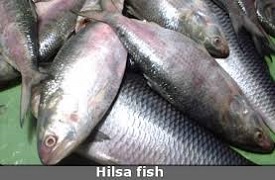
West Bengal State Department of fisheries is planning to include provisions under penal codes that will allow the arrest of anyone buying and selling the Hilsa Fish weighing less than 500 gms. It is an attempt to save the endangered Hilsa Fish from getting extinct. With this decision, Hilsa Fish became the first fish to attain legal protection.
Hilsa fish has been in danger due to migration barriers, over-fishing and pollution. Assessment of the production trends of the Hilsa from 1961 to 2013 has declined from 36 tonnes to 0.9 tonnes.
News 7 - WEF and UCSB entered an MOU to save the World's Ocean Economy

To meet the ocean sustainable development goal, World Economic Forum and the UCSB's Marine Science Institute have united to improve health of world's oceans and maritime resources.
David and Lucile Packard Foundation will fund the project to advance ocean science, protection and management. As per the World Wildlife Fund, oceans generate goods and services worth an estimated USD 2.5 trillion per year, equivalent to the seventh largest economy in the world. Project will be supported by supported by the Benioff Ocean Initiative, an applied program within the University of California, Santa Barbara
News 8 - ISKCON’s eco village becomes the 1st village to be honoured with a UN award
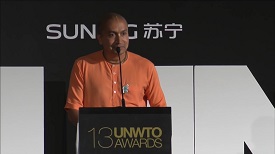
United Nations World Tourism Organisation (UNWTO) Awards for Excellence and Innovation in Tourism honoured ISKCON’s Govardhan eco village with UN award for adopting innovative measures of ’sustainable tourism’ in country. It has been for the first time that India has won such recognition from the UN in the NGO sector.
The project linked tourism initiatives at the Govardhan Eco village by providing basic needs to the local tribal communities in villages.
News 9 - India along with the UK launched a project against Delhi’s air pollution
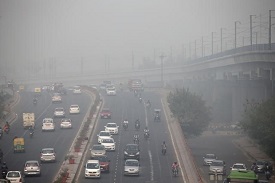
With alarming air pollution levels in Delhi, India partnered with British experts to check the causes of pollution. A project named ‘ASAP-Delhi: An Integrated Study of Air Pollutant Sources in the Delhi National Capital Region’ has been launched, where Birmingham team involves experts from the Indian Institute of Technology Delhi, the Indian National Physical Laboratory and the University of Surrey.
Experts will study the airborne particulate matter and analyze how the pollution is being generated. Further, results will be implemented to wider NERC program, thus improving population health.
News 10 - IMD plans weather stations in 660 districts
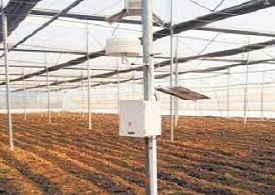
The Indian Meteorological Department has decided to set up weather stations in 660 districts of the country. The plan envisages to cover 660 districts by 2019. In the first phase, the IMD plans to set up the system in 130 districts which have already been shortlisted.
The IMD has also tied up with the Ministry of Agriculture to use the Krishi Vigyan Kendras, under the Indian Council of Agricultural Research, ICAR in the districts, to use them as weather forecasting observatories.



